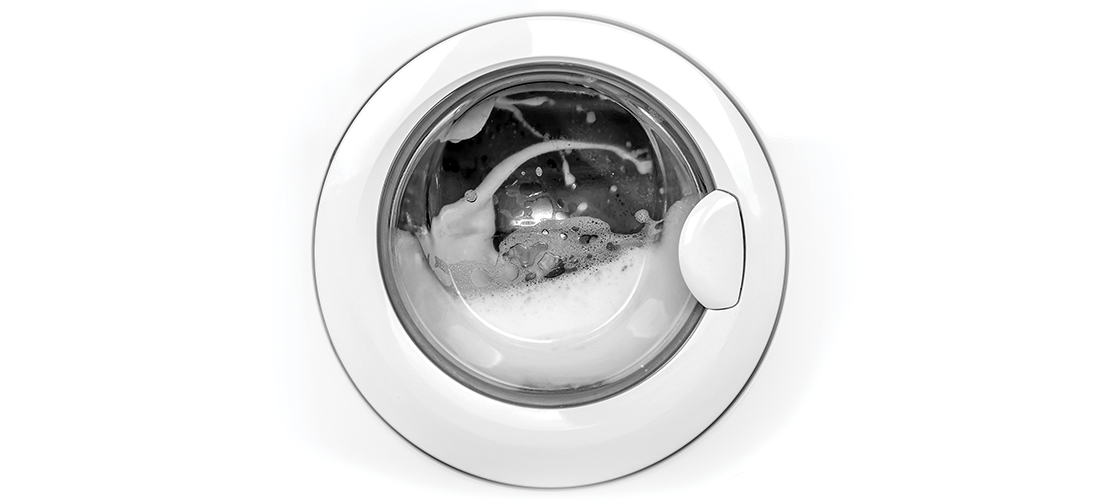
The Speed Queen
Let’s hope she’s as simple as advertised
By Cynthia Adams
Cliff Ginn was in a lather about washing machines.
He owns a small textile-related business and, having weathered many storms given the tumult of the industry, has mastered self-control.
But today he is more agitated than, well, his dying washing machine’s agitator. I listen sympathetically while handing over the UPS package I’d accepted for him while he was out at appliance stores.
“I want a dumb washing machine,” he states flatly. “I want the Volkswagen Beetle of washing machines!”
A Dapper Dan, Ginn could care less about washing machine style or function.
“Why should it care if my cotton is from Egypt or from Mississippi? Or, if my cashmere sweater is virgin or not? I do not judge.”
A de-wrinkling feature perhaps? No thanks.
“If I want to de-wrinkle something, I will just throw it in the drier with a wet rag.”
On he went with the questions.
“Must the washer and drier match?” he asks plaintively.
No.
Well, maybe.
“I do like for my shoes and belt to match.”
Ginn complains about the steep learning curve for gadgets on his 2020 Volvo sedan. He definitely isn’t looking for a washing machine that requires him watching YouTube.
He was searching for the simplest machine to be found. One with an on and off button, he jokes. No fancy panels or electronic controls. Nothing that will die or confound him.
He even sat down and wrote an angsty rant about it:
“This is a year when I bought a new car with electronics that would make a 16-year-old-boy drool. And the prospect of having to buy a new iPhone . . . But back to the washing machine. It’s asking too much of me. Why so many choices and features.” (He was too distraught to insert question marks.)
Simplicity of design was what Ginn sought.
One such simplified machine still exists. It lacks the high-profile brand awareness of Maytag, Miele, LG or GE.
Its name is Speed Queen.
“Speed Queen!” he exclaims days later, over the phone. He was keeping me informed of his progress and had just discovered this brand at an old-school appliance store.
In a very short while, Ginn called to report back.
“I am on my way to do something every grown man dreads,” he says with the resignation of the already beaten. “And it’s not a colonoscopy.”
A long pause.
“It’s buying a washing machine.”
I knew appliance angst well.
An ill-fated encounter with a smart washing machine occurred more than 20 years ago in Genoa, Italy. I travelled with my friend, Dixie Hodge, to the home of Pat and Loren Schweninger. We were to stay there while they were away.
Arriving at the Genoa train station, my friend was suddenly distracted by a mob of gesticulating, chattering women who lifted her wallet. We were shaken, but gathered ourselves and trundled on with our cases.
The Schweningers’ rental, on a hillside overlooking the port city, was memorably reached via funicular.
I emptied all my clothing into their Italian-made, front-loading machine before dinner. I had no idea how to operate the machine, guessing at the foreign settings.
What seemed like hours later, my clothes — all my clothes — were still washing away.
Back home, my old top-loader would have been long finished.
After madly pressing buttons, it chugged to a stop — with all my soggy clothes inside clearly visible through the machine’s window.
The door could not be opened.
I knocked at the neighbor’s door, trying to explain that the machine was broken. Did they have any knowledge of washing machines? Or at least that’s what I attempted to ask, using a pastiche of English and terrible Italian.
Her reply was in English: “Call the Candy Man.”
What?
Turns out the machine was by Italy’s most popular brand — Candy. Candy was the first to bring front-loading machines to the Italian market.
Their website states (in a convoluted translation) that the brand has been “part of Italian industrial history since 1945, when it launched the Model 50, the first washing machine thought for the households.”
The “thought for the households” is a charming touch — versus, what? Thought for use outside the home?
With my travel funds depleted and my friend’s wallet gone, I counted my lire.
How much was a house call going to cost?
Quick answer: all the lire I had.
The next morning, the Genovese Candy Man spent about two minutes looking at the machine. He pushed two buttons, the spin cycle began, and he grinned.
Clean clothes. Cleaned out pockets. Now both my friend and I were cashless in Genoa.
It was several years before I could be persuaded to consider a water-conserving front-loader.
As for Ginn?
It isn’t about the cash. He is a true believer in good design in both his wardrobe and his home. He admires and collects art. Italian-made shoes. Buttery-soft leather coats. German and Italian sports cars.
He and his girlfriend admire the finer things in life, and he has even written her poetry in Italian.
But Ginn has technology fatigue. He does not want to study the manual to decipher sleek electronics. He wants knobs to turn and buttons, as we say in the South, “to mash.”
Ginn has discovered he is a top-down kind of appliance man, one who believes — and plans to invest — in the simplest possible washing machine.
One that is top-loading, with an old-fashioned clothes agitator that stops whenever you open the lid to toss in one more thing.
Design simplicity at its finest.
“I don’t ask to save the planet,” he wrote to me later, “only to have white boxers.”
It will cost Ginn, of course. Simplicity doesn’t come cheaply.
But the smart money is on the Speed Queen. PS
Cynthia Adams is a contributing editor to PineStraw and O.Henry.





